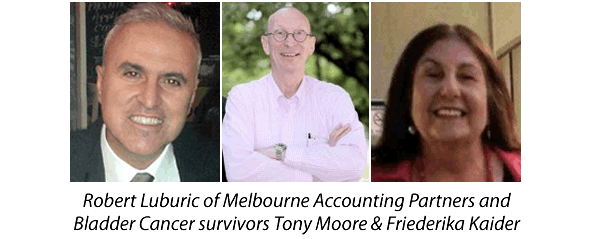
Hi to everyone!
When diagnosed 13 years ago, facing a December cystectomy & neo bladder, the information available to me was scant. The best patient information I could find was in the UK & the USA.
At BladderCancer.org.au we are proud to say that the resources we have generated since, to support all people involved with bladder cancer, have been an enormous help to Australians, and people all over the world. Quite a few other charities have sprung up in the last decade to help with awareness about bladder cancer. We are flattered that we have many imitators!
The true depth of our board comes through patients with real life experience, and above all, our medical team. Thanks to our board for a successful 2024 and great plans for 2025.
The BladderCancer.org.au Medical Team

The Engine Room

This newsletter brings updated information about bladder cancer treatments from our medical team.
Best wishes and season’s greetings to all our supporters. We work to support you, without one cent from Government. All volunteers. If you can, please make a donation to help us continue our work and provide the resources patients and medicos need.
Tony
Co Founder BladderCancer.org.au
TV in 2025!!
We would like to give a shout out to one of the big pharma companies – astellas who have committed to supporting us with a bladder cancer awareness campaign on TV in May next year!
The focus will be on SBS channels, with multi lingual ads. This way we can get best bang for our buck.
If you want to support a TV campaign with us in May, on Ch7, Ch10 or Ch9, we would be delighted to discuss. All ads can include your brand. Contact tony.moore@bladdercancer.org.au to discuss.
Immunotherapy
An update from Shane on immunotherapy treatments for bladder cancer.

Immunotherapy has been an area of significant research in recent years. A plethora of clinical trials have been undertaken investigating their use in the treatment of metastatic bladder cancer. Immune checkpoint inhibitors have emerged as new targeted agents (e.g. pembrolizumab, avelumab, nivolumab) that are used in certain settings. They could also be considered in patients with a poor functional baseline instead of chemotherapy, but is still an unclear area requiring further research.
1. Pembrolizumab (pharmaceutical name Keytruda) does not have a survival benefit over standard chemotherapy. As such, it is approved by the TGA as the next-line option in patients who are not eligible for any platinum-based chemotherapy. However, it is not PBS subsidised for this purpose. Furthermore, pembrolizumab is also used as second-line treatment in patients who have had metastatic bladder cancer after having had platinum-based chemotherapy. It is both TGA and PBS-approved for this indication.
Read more…
Shane is a Urology Research Fellow at Austin Health and Secretary for BladderCancer.org.au
New Treatments
Mehdi contributes an article on newer bladder cancer treatments and how they work. Learn about these new (and still experimental) treatments.

Novel intravesical (“in-bladder”) therapies for non-muscle-invasive bladder cancer (NMIBC) refractory to conventional therapies
Non-muscle-invasive bladder cancer (NMIBC) is a form of bladder cancer that remains within the bladder lining and has not invaded deeper tissues. Standard treatments, such as intravesical (“in-bladder”) Bacillus Calmette-Guérin (BCG) (a live attenuated bacteria) or chemotherapy, are usually effective. However, these treatments may fail to control the disease for some patients.
After ensuring adequate delivery of conventional therapies, the urologist may recommend cystectomy (removal of the bladder) as the next step for refractory cases, depending on patient circumstances. Novel therapies may be considered for those who are unable to undergo surgery or prefer bladder-preserving options. Many of these therapies are still experimental, and their long-term effectiveness is unclear. Some therapies may only be offered at specific centres or within clinical trials (requiring meeting strict eligibility criteria), and some are still not available in Australia.
Agents with multiple studies supporting their use (still experimental)
1. Second-agent intravesical chemotherapy
What it is: When first-line chemotherapy or BCG fails, alternative drugs may be administered to the bladder. These agents work by damaging the DNA of cancer cells. This prevents the cancer cells from dividing and growing. Examples: Gemcitabine, docetaxel…
Read more…
Mehdi Adhami is a Urology Research Fellow at Icon Cancer Centre and Monash University School of Translational Medicine. He volunteers with YURO and is a board member of BladderCancer.org.au

Season’s Greetings to all from the BladderCancer.org.au team.